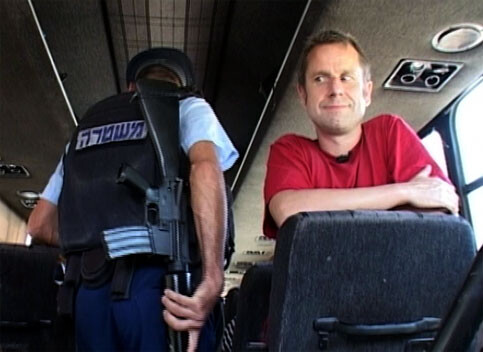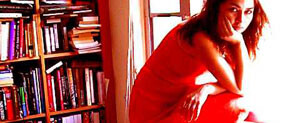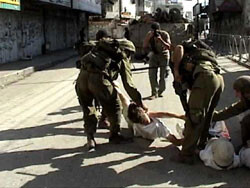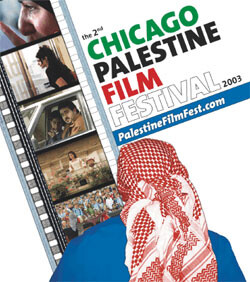The Electronic Intifada 27 May 2003

An Israeli policeman searches the coach while Jeremy Hardy holds his breath.
Although the film Jeremy Hardy vs. the Israeli Army was “on one hand [intended for] a British audience,” as explained by director Leila Sansour, it also aimed to communicate to the rest of the world that Palestine isn’t just a land of “sad faces and dead bodies.” Sansour wanted to show a universal audience “that it’s a hospitable place” like the Palestine that lives in her memory.

Leila Sansour
By using Hardy, Sansour makes the film accessible to all audiences, not just those already sympathetic to the Palestinian cause. Hardy’s sense of humor makes the uncomfortable topics easier to digest, and his regular-guy attitude helps the audience realize that it isn’t just hard-core activists that are dropping everything to help Palestinians, but it’s average people who are making sacrifices as well.

Israeli soldiers drag protesting ISM members in a West Bank street.
Hardy traveled to Bethlehem in April 2002, right after the siege of the Church of the Nativity. For Hardy, it was either going to Palestine or spending his holiday with his in-laws in Florida. “Palestine won,” he says. Once there, Hardy learns the principles of nonviolent resistance and how to dismantle the Israeli system of control. Given a tour by the mayor of Bethlehem, he sees first hand the bullet pocked statue of the Virgin Mary in front of a maternity hospital.
And then things begin to heat up for Hardy. Although the project had already encountered some problems — the film crew couldn’t get in the city so they had to enlist the help of a wedding photographer — a curfew is announced while Hardy is served tea at the house of one of Sansour’s relatives.
Although Hardy is at first skeptical of the ISM, he is converted after witnessing one of his peers get shot by a soldier inside an Israeli tank. He says, “A few moments ago I was terrified. Now I’m just stunned and angry.” And Sansour’s audience sees it all — the straight footage, not accompanied by dramatic music, sharply portrays that these peace activists, clearly unarmed and non-aggressive, were shot at for no reason whatsoever.

Hardy, with “a sense of unfinished business,” returns to Palestine the following July. While traveling to a refugee camp, he is given the responsibility of holding a box of medical supplies. Hardy jokes that the box is a good excuse for “hanging out in the back.” But when stopped by an Israeli soldier, Hardy mouths off on the soldier’s gun, saying, “That’s big — how many bullets does it fire, mister? It really impresses the chicks.”
Despite run-ins with the army and witnessing occupation’s inhumanity, Hardy keeps his sense of humor. Likewise, Sansour maintains her flexibility despite losing part of her crew and the challenges imposed by the curfew on Bethlehem.
When asked about her process of film making, Sansour said that right away she decided that “I’m not going to be hiding the process because I was already … realizing that the process is going to be quite difficult, that this project is not going to be easy to plan, because basically any plan can fail due to the circumstances. And so I was already prepared to be open about and be flexible about what’s happening.” She added, “I also didn’t know Jeremy, so I had to be very sensitive to his personality, what he’s doing, and also be open to what I’m going to be receiving from his character.”
Hardy offers much character. Although he says silly things like he “seeks strength from falafel” while others gain their strength through activism, his reflections are often telling. At one point he notes, “I promised to my daughter to keep safe. I hope I can keep the promise.” Sansour becomes a character as well. After all, the film’s goal is very personal and important to her. Hardy says in the film, “Leila dreams that the whole world will show up in the West Bank.”
Commenting on her feelings while making the film, director Leila Sansour told EI, “The more dominant feeling for me was a sense of relief because I was so angry about the situation and I think a lot of Palestinians living abroad, like me, feel very helpless and … [that] anger that builds up every day. I think that doing something about it made the difference to me, to my mental health, so I actually felt in some ways invigorated that there’s something that I could do rather than staying home to watch the news.”
Sansour has gained at least one recruit. Hardy says at the very end of the film, “She’s got me in the ranks now.” And now that the Israeli government is currently barring peace activists from entering the country, the message of Sansour’s film is more important than ever.
Maureen Clare Murphy is a frequent contributor to both EI and eIraq and is editor of F-News and lives in Chicago.





